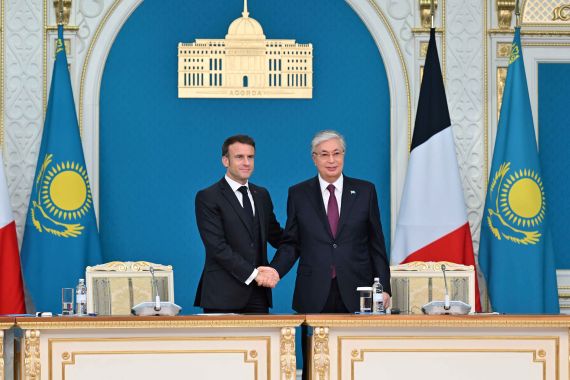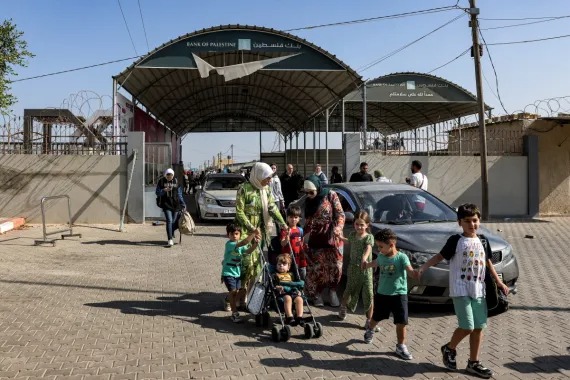In a bid to bolster France’s influence in Central Asia and counter the formidable presence of Russia and China in the region, French President Emmanuel Macron embarked on a strategic tour, beginning with his visit to Kazakhstan. Macron’s visit comes at a crucial juncture, with the region increasingly drawing the attention of major global powers seeking to secure their interests. The French leader’s mission is not only to deepen diplomatic ties but also to explore avenues of collaboration across various key sectors.
Economic Pacts Sealed in Kazakhstan
During his visit to Kazakhstan, President Macron met with Kazakhstan’s President Kassym-Jomart Tokayev, where both leaders engaged in high-level talks aimed at “accelerating cooperation” in vital sectors. In a significant display of commitment, the two nations signed multiple agreements that encompass crucial areas such as clean energy technology, pharmaceuticals, and aerospace. Macron, during a news conference held in the Kazakh capital, Astana, emphasized the strength of the partnership, highlighting the necessity to further complement and expedite their collaborative efforts.
Tokayev echoed Macron’s sentiments, hailing France as a “key and reliable partner” within the European Union, expressing his intent to inject fresh momentum into this partnership. France, standing as the fifth-largest foreign investor in Kazakhstan, maintains a longstanding relationship, exemplified by the monumental Kashagan offshore oilfield project in collaboration with the French energy giant TotalEnergies. Additionally, a French company, Orano, oversees a uranium mine in the country, further enhancing their strategic ties. Notably, French energy behemoth EDF is currently in the running to construct Kazakhstan’s inaugural nuclear power station.
A Shift Away from Moscow’s Shadow
Kazakhstan’s evolving foreign policy landscape has witnessed a noticeable drift away from Moscow’s influence in recent years. The government in Astana has firmly rejected recognizing the legitimacy of breakaway states in Ukraine and has even aligned itself with Western sanctions against Russia. Such moves signify Kazakhstan’s desire to foster robust strategic partnerships with Western nations. Moreover, the country has assumed the role of an oil supplier to European nations that have chosen to diversify their energy sources away from Russian oil. As Russia remains preoccupied with the ongoing conflict in Ukraine, other global powers are actively intensifying their efforts to establish strategic partnerships in the resource-rich Central Asian region, a development that has raised concerns in Moscow.
Russian Foreign Minister Sergey Lavrov recently voiced apprehensions about Western nations attempting to lure away Russia’s “neighbours, friends, and allies.” These concerns align with a broader pattern of Russia expressing unease about Western influence in Central Asia. Alexander Shevtsov, a deputy of Russia’s Security Council, accused the United States and its allies of promoting nationalist sentiment and manipulating public opinion in the region.
China’s Growing Influence
On a parallel track, China has cultivated strong ties with Kazakhstan, making substantial investments, particularly in infrastructure and energy projects. Furthermore, Kazakhstan occupies a pivotal position within China’s ambitious China-Europe trade route, circumventing Russia. Chinese President Xi Jinping has outlined extensive plans for Central Asia’s development, offering substantial financing and grants to boost economic growth and foster cooperation.
Turkey’s Expanding Interest
As Macron continues his tour of Central Asia, Turkish President Recep Tayyip Erdogan is set to visit Astana shortly after. Turkey, too, has been showing a growing interest in the region, underlining the geopolitical significance of Central Asia in the current global landscape.
Emmanuel Macron’s visit to Central Asia is not merely a diplomatic tour but a strategic maneuver by France to establish a stronger foothold in a region brimming with opportunities and challenges. As Russia, China, and now Turkey vie for influence in this resource-rich expanse, the balance of power in Central Asia is undergoing a transformative shift, with potential ramifications for international politics and trade in the years to come. Macron’s visit to Kazakhstan is just the opening gambit in a geopolitical chess game that is poised to intensify.
















